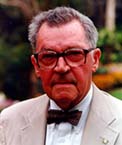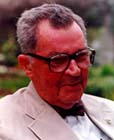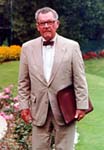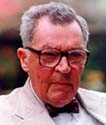The Rediff Interview / Robert Goheen
'The US will never support the creation of Khalistan'
 If diplomacy is the art of improving relations between nations,
former United States ambassador to India Robert F
Goheen should
be credited as the front runner among all those American envoys
who served in India these last fifty years.
If diplomacy is the art of improving relations between nations,
former United States ambassador to India Robert F
Goheen should
be credited as the front runner among all those American envoys
who served in India these last fifty years.
"Indo-US relations were at their best during those years
when Jimmy Carter was American president and Morarji Desai the
Indian prime minister," says Goheen.
And the men who managed relations between the two
countries during 1977 and 1980 were Goheen and Nani A Palkhivala,
the famed jurist who was India's ambassador to Washington.
The 78-year-old Goheen's affection and abiding interest in India and its culture
does not arise from his eventful stint as a successful diplomat alone.
"I cannot forget India because I was born and
brought up here," he says.
Goheen was born in Vengurla in present day Maharashtra in 1919 of
Presbyterian American missionary parents. His father, a doctor,
and mother, a teacher, carried out selfless service, when
young Robert went to school in Madras state.
At 15, he went to the US for further studies. And in 1957, at 37,
he became the youngest-ever president of Princeton university.
In an exclusive interview to Rediff On The NeT, Goheen -- who was in New Delhi
last week as part of an Asia Society delegation -- tells
George Iype why he is committed to supporting India, particularly in
the context of Indo-Pakistan relations.
How is present-day diplomacy different from your time?
 The nature of diplomacy in the 1950s and 1990s remains the same.
But the subject matter of diplomacy has definitely changed over
the years. For example, in the 1970s in India there was no Indian
interest in commerce or investment from the United States. We
did not talk much about trade and commerce at that time. But right
now there is a great deal of economic interests between the US
and India.
The nature of diplomacy in the 1950s and 1990s remains the same.
But the subject matter of diplomacy has definitely changed over
the years. For example, in the 1970s in India there was no Indian
interest in commerce or investment from the United States. We
did not talk much about trade and commerce at that time. But right
now there is a great deal of economic interests between the US
and India.
The present US and Indian ambassadors are very much
tied up in matters of trade, commerce and investment. But during
my time, we talked pure diplomacy. We tried to talk to people,
persuade them, finding out solutions to crucial issues.
Do you think present-day diplomacy is much
easier because there is no Cold War, no Eastern bloc and no Western bloc now?
Present day diplomacy is quite different and challenging
because there is a quite deal of interaction between nations now.
For instance, there is much more interaction between India and
the United States now than there was in the late 1970s. At that
time, the relationship between India and the US was entirely political,
government to government level. There was no economic depth in
the relations then.
Do you say that Indian economic reforms have sparked off
this flurry of diplomatic activity between the US and India?
Yes. Now there is a lot of activity going on between the Indian
and the American governments with the sole cause of promoting trade
and commerce. I would say the face of US diplomatic activity
in India has changed due to India's economic liberalisation.
Today, the US ambassador in India talks more trade and commerce
than politics.
Can the ongoing economic reforms make India an Asian Tiger?
If India sustains the momentum of the reform process, it will definitely make the country an Asian Tiger.
Don't you think the Indo-US relations are getting strained
in recent times?
 I think the Indo-US relations at the government to government
level is quite good now. It was in fact best during the time
of President Jimmy Carter and Prime Minister Morarji
Desai under the Janata government. But when Indira Gandhi
came back to power, the Afghan war with the Russians complicated
Indo-US relations somewhat. There are always occasional, small
irritants which come in the way of relations between India and
the US. But these will not weaken Indo-US relations.
I think the Indo-US relations at the government to government
level is quite good now. It was in fact best during the time
of President Jimmy Carter and Prime Minister Morarji
Desai under the Janata government. But when Indira Gandhi
came back to power, the Afghan war with the Russians complicated
Indo-US relations somewhat. There are always occasional, small
irritants which come in the way of relations between India and
the US. But these will not weaken Indo-US relations.
Last week, White House spokesperson Michael McCurry
said the US considers Kashmir 'disputed principality.'
I know McCurry very well. I would say that he made a very bad
mistake by that statement. India should not take seriously everything
that a public relations officer or a US senator says as a policy
statement of the US government. If an Indian minister says
something silly, that does not mean it is the policy of the Indian
government. So McCurry's statement carries no weight.
US Vice-President Al Gore supported the creation
of Khalistan within India last week.
He did not say that. It was misreported by a reporter. And
our government has apologised for that. The US will never support
the creation of Khalistan.
Do you think US interference is a stumbling block in improving
Indo-Pakistan relations?
 I think the American government wants Indians and Pakistanis
to work out their relationships themselves. If any of them wants
our help, or both of them want our help, I believe my government
is ready to do that. The US does not want to exert pressure on
Indo-Pak relations.
I think the American government wants Indians and Pakistanis
to work out their relationships themselves. If any of them wants
our help, or both of them want our help, I believe my government
is ready to do that. The US does not want to exert pressure on
Indo-Pak relations.
Do you think Kashmir is an integral part of India?
I think, under the agreement worked out by the British with
the princely states of India, Kashmir is a legal part of India.
This is my personal view and I do not speak for the US government.
I also believe that practically, it does not make sense for India
to continue without Kashmir.
Don't you think the US has been consistently conveying to the
world that India is wrong and Pakistan is right in Kashmir?
No, I do not think that. Indians may feel so, but I do
not think that is the right feeling.
Hasn't the US all these years sought to take away the Kashmir
issue from the hands of both India and Pakistan?
I believe the US government wants India and Pakistan to find
a solution to Kashmir among themselves. No third party, not even
the United Nations, can influence the situation in Kashmir very
much at this juncture.
 Don't you think India should be made a permanent member
of the UN Security Council?
Don't you think India should be made a permanent member
of the UN Security Council?
Personally I would like to see that. But others are also
in the queue. Japan wants to be a member. Brazil also wants to
become a member. My own view is that the Security Council should
be enlarged to improve the representation from the Third World.
Photographs: Atul Chowdhury
Tell us what you think of this interview
|





